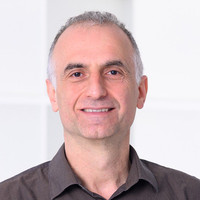TNF is an inflammatory cytokine that has pleiotropic effects on various tissues. Its central role in inflammation has been lately demonstrated by the efficacy of anti-TNF antibodies in controlling inflammatory diseases. Vascular endothelium represents one of the major targets of TNF which emits diverse responses when exposed to inflammatory conditions. Disease-associated pathogenic vascularization or vascular destruction often occurs in response to excessive TNF. The underlying molecular mechanisms of such diverse vascular responses to TNF have not been yet elucidated. Here we will explore the molecular mechanism of pleiotropic EC responses to TNF and further aim to develop a novel therapeutic concept in order to normalize vessel functions under inflammatory condition. We will in particular focus on inhibitor of apoptosis proteins (IAPs) as key regulating diverge cellular responses to TNF. We will strongly benefit from newly established transgenic mice in our laboratory which harbor EC-specific alteration of IAPs and will utilize experimental disease model systems addressing the function of TNF/IAPs in vessel integrity/function in wound healing and tumor growth. We will implement novel drugs specifically targeting IAPs and their two major downstream targets, RIPK1 and NIK, under disease condition. The data obtained will significantly increase our knowledge about the vascular responses to inflammatory disease conditions and will provide important impetus for developing novel therapeutic protocols for inflammatory disorders.
Inflammatory diseases affect approximately 7.6–9.4% of the world population. The majority of these diseases involves vascular endothelium leading to multi-organ involvement. Anti-TNF therapy can efficiently reduce tissue damage and improve vascular function. This project aims to exploit the recent in-depth molecular knowledge on TNF signaling and evaluate emerging novel compounds which interfere with TNF-signaling as new therapeutic options for inflammatory disorder.

Institute for Molecular Immunology | CECAD Research Center
CMMC - PI - B 06
Head - CMMC Cell Sorting Facility
+49 221 478 84091
+49 221 478 32002
Institute for Molecular Immunology | CECAD Research Center
Joseph-Stelzmann-Str. 26
50931 Cologne
PostDocs
Jens Michale Seeger, Mila Daoud, Paul Werthenbach, Alina Farid, Johanna Stachelscheid, Melanie Fritsch, Noëlle Sieg
PhD students
Bessarta Thaqi, Larissa Groth, Hossein Hozhabri
Master students
Daniela Hahn, Ben Lengert
Medical students
Patrick Glaser, Marius Rühl
Technicians
Maureen Menning, Ali Manav, Tanja Roth